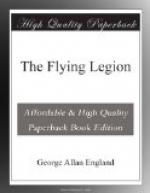“Yes,” assented the woman. Then she added: “Spartan simplicity, is it not? No elaborate coffers. Not even leather sacks. Just bins, like so much wheat.”
“The shining wheat of Araby!”
“Of the whole Orient!”
They fell silent, peering with fixed attention. And gradually some calm returned to the others. At the door, too, the turmoil had ceased. No doubt the Jannati Shahr men, baffled, had sent for much gunpowder to blow in the massive planking. That silence became ominous.
Still the Legionaries could take no thought of anything but the Caliph el Walid’s hoard. As they stood, squatted, or knelt around the pits—pits about two and a half feet square and deeper than the deepest thrust of any arm—it seemed to them that bottomless lakes and seas of light were opening down, down below them into unfathomed depths of beauty.
Such beauty caused the soul to drink nepenthes of forgetfulness. Hardships, wounds, blood, pain, menace of death faded under that spell. That the Legionaries were trapped at the bottom of a vast rabbit-warren, with swarms of Moslem ferrets soon to rush upon them, now seemed to have no significance.
Tranced, “indifferent to Fate,” the adventurers peered on greater wealth of jewels than ever elsewhere in this world’s history had been garnered in one place. The liquid light of the hoard flashed strange radiances on their tanned, deep-lined faces, now smeared with sweat and dust, with powder-grime and blood. Their eyes were beholding unutterable rainbows, flashings and burning glows like those of the Moslem’s own Jebel Radhwa, or Mountain of Paradise.
Each of these jewels—several million gems, at the least computation—what a story it might have told! What a tale of remotest antiquity, of wild adventures and romance, of love, hate, death! What a revelation of harem, palace, treasury, of cavern, temple, throne! Of Hindu ghat, Egyptian pyramid, Persian garden, Afghan fastness, Chinese pagoda, Burmese minaret! Of enchanted moonlight, blazing sun, dim starlight! Of passion and of pain!
On what proud hand of Sultan, emir, cadi, prince, had this huge ruby burned? On what beloved breast or brow of princess, nautch-girl, concubine—yes, maybe of slave exalted to the purple—had that fire-gleaming diamond blazed?
From Roman times, from Greek, from ancient Jerusalem, from the fire-breathing shrines of Baal at long-dead Carthage, perhaps, this topaz might have come. This sapphire might have graced the anklet of some beauty of old Nile, ages before King Solomon wielded the scepter, ages even before the great god Osiris reigned.
That amethyst might have been loot of the swift black galleys of Tyre, in joyous days when men’s strong arms took what they could, of women or of gems, and when Power was Law!
Imagination ran riot there, gazing down upon those jewel-pits. In them lay every kind of precious stone for which, from remotest antiquity, men had cheated, schemed, lied, fought, murdered. The jewels showed no attempt at sorting or classification. With true Oriental laissez-faire, they were all mingled quite at random; these gems, any chance handfuls of which must have meant an incalculable fortune.




